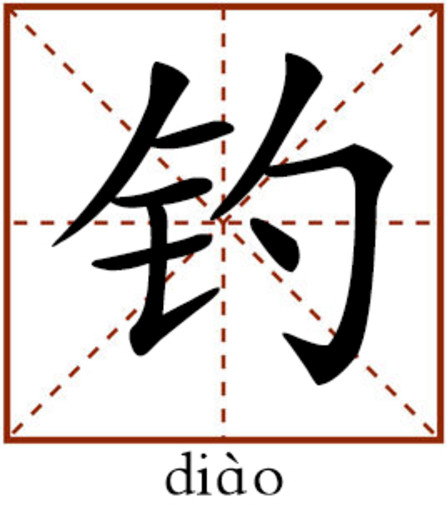Angling

Fishing provided a means for ancient Chinese scholars to pursue harmony between humanity and nature. It also provided a theme for them to communicate their feelings in literature.
姜太公钓鱼
jiāngtàigōng diàoyú
Jiang Taigong (Great Duke) refers to Jiang Shang, the prime minister under Emperor Wen of the Zhou Dynasty. Jiang was later designated as the first king of the Qi Kingdom. Hence, Jiang was also known as Qi Taigong. Diaoyu means “to fish.”
The story goes that Jiang became impoverished when he was 72. Using no fish bait, he fished with a straight hook one meter above the water by the Wei River. He said to himself “Those who are destined for me please bite the hook.” Eventually, Emperor Wen, the founder of the Zhou Dynasty encountered him when he was fishing. Invited to be the prime minister, Jiang helped the Zhou tribe overthrow the Shang Dynasty.
Because of this, silently angling like Jiang Taigong then became a symbol of waiting for a chance to realize one’s aspirations.
庄子钓于濮水
zhuāngzĭ diào yú pú shuĭ
Zhuangzi refers to Taoist philosopher Chuang Tzu (c.369-c.286 BCE). Diao means “to fish.” Yu means “at.” Shui means “river” and Pu Shui means Pu River.
In one of his allegorical writings, Chuang Tzu told a story about himself. Chuang Tzu was fishing in the Pu River when the king of Chu Kingdom sent two ministers to invite him to court, saying, “We’d like to entrust you with state affairs.” Holding the fishing rod in his hand, Chuang did not look back, saying, “I’ve heard that there is a sacred turtle in Chu Kingdom, which was dead for three thousand years. The king keeps it in a bamboo case covered with a kerchief. Would this turtle prefer to be dead and kept in such a grand style or to be alive and able to drag its tail in the mud? ” The ministers said, “It would prefer to be alive and drag its tail in the mud.” Chuang said, “Please go away, then. I’d rather drag my tail in the mud.”
This allegory, or simply “the turtle dragging its tail in the mud,” was used to demonstrate one’s preference for a humble but free life, over a glorified life with limited freedom.
(edited by CHEN ALONG)
